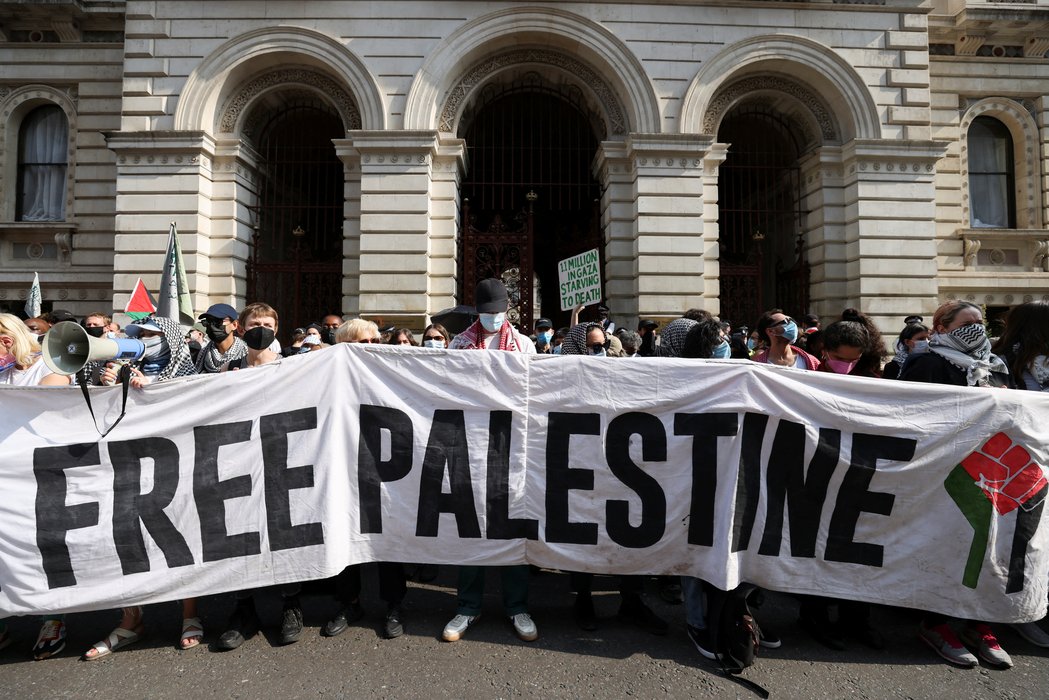
Freedom of association
In the United Kingdom, authorities have increasingly employed broad powers provided by the Terrorism Act against pro-Palestinian activists and journalists reporting on Israel and Palestine.
On 6th August 2024, six activists were arrested in Filton, Bristol at the site of Israeli military intelligence company Elbit Systems, while attempting to disrupt the production of weapons they argue contribute to violence in Gaza. The activists were detained under the Terrorism Act, which allows for up to seven days in custody without charge, a period that can be extended to 14 days. Following the arrests, the police claimed that the activists had used violence against police and private security guards. Palestine Action, the group behind the protest, argues that these allegations are a “smear campaign” aimed at influencing public opinion and prejudicing the outcome of the trial, while justifying the use of extended powers of arrest. On 13th August, the Crown Prosecution Service (CPS) announced that the group, aged between 20 and 51, had been charged with criminal damage to property, violent disorder and aggravated burglary.
On 29th August 2024, Richard Barnard, co-founder of the activist group Palestine Action, was arrested by UK police on multiple charges, including one related to terrorism. Barnard was called to appear before a magistrates' court on 18th September on three separate charges, one of which involves “expressing an opinion that is supportive of a proscribed organisation contrary to section 12 of the Terrorism Act.” Additionally, he is accused of “encouraging or intending to encourage criminal damage.” The charges stem from two protests: one held on 8th October 2023, a day after the Hamas attack on southern Israel, and another on 11th October. The prosecution sought bail conditions prohibiting Barnard from attending protests or being within 100 metres of such a protest. However, the judge did not impose any conditions.
Sarah Wilkinson, another pro-Palestine campaigner, was also arrested on 29th August. According to information posted on social media by Wilkinson’s relatives, a dozen police officers raided their home at 7:30 a.m., citing her online content as the reason for her arrest. Wilkinson has been an outspoken advocate for Palestinian causes on social media and is affiliated with MENA Uncensored, a news organisation focused on the Middle East and North Africa. In a media interview, Wilkinson described how plainclothes police officers entered her home, handcuffed her and “ransacked” her home during the raid, emptying an urn containing her mother’s ashes. She said she was held for hours and deprived of her medication before being released later the same day. Independent Palestine-focused outlet Mondoweiss reported Wilkinson’s arrest was also under the provisions of the Terrorism Act. Her bail conditions, which included a ban on using electronic devices or public transport, were lifted a week later, according to a video she shared on social media.
Freedom of expression
Journalist Richard Medhurst also reported that he was detained under the Terrorism Act on his arrival at London’s Heathrow Airport on 15th August. Medhurst, who is known for his commentary on Middle Eastern issues, particularly the Israeli-Palestinian conflict, described the incident as part of a wider crackdown on Palestinian concerns. He expressed fears that his arrest was intended to intimidate journalists reporting on Palestine. Medhurst said he was interrogated for almost 24 hours, his phone was confiscated and he was unable to contact his family. He said he was searched twice in ten minutes and his belongings, including his journalistic equipment, were seized. The International Federation of Journalists (IFJ) and the National Union of Journalists (NUJ) in the UK and Ireland condemned Medhurst’s arrest and expressed “grave concern” at the “apparent mis-use of anti-terror legislation and consequential undermining of media freedom”, of which the case was an example.
The home of Asa Winstanley, an associate editor at The Electronic Intifada, was raided by officers from the Metropolitan Police's Counter Terrorism Command at around 6 a.m. on 17th October 2024. They produced a warrant that allowed them to search his house and vehicle and seize electronic devices. The warrant cited potential offences under sections 1 (Encouragement of Terrorism) and 2 (Dissemination of Terrorist Publications) of the United Kingdom’s 2006 Terrorism Act, which carry a maximum sentence of 15 years’ imprisonment. The Committee to Protect Journalists condemned the incident, calling on British authorities to cease using counter-terrorism laws to intimidate the press.
The Electronic Intifada has reported that, during the raid, an officer informed Winstanley that the raid was connected to his social media posts. Despite seizing Winstanley's laptops and phone, the officers did not make an arrest.
Freedom of peaceful assembly
In July 2024, five Just Stop Oil activists—Roger Hallam, Daniel Shaw, Louise Lancaster, Lucia Whittaker De Abreu, and Cressida Gethin—received significant prison sentences for “conspiracy to cause a public nuisance” by planning a peaceful protest disrupting traffic on London’s M25 motorway in November 2022. Hallam, regarded as the lead organiser, was sentenced to five years, while the others received four-year terms each. According to the Guardian, these are thought to be the longest sentences ever given in the UK for non-violent protest actions. The group’s offence stems from their participation in a Zoom call, in which they encouraged volunteers to climb gantries along the motorway and disrupt traffic, aiming to draw attention to their demand for an end to new oil and gas exploration in the North Sea.
During sentencing, Judge Christopher Hehir recognised the legitimacy of the defendants’ climate concerns but criticised their methods, saying they had “crossed the line from concerned campaigner to fanatic”, arguing that their actions disregarded the democratic process and the rights of the public, who he said were forced to endure significant disruption to their daily lives. The judge's decision followed the defendants' attempt to defend their actions as necessary due to the urgency of the climate crisis, which they argued justified the disruption they caused.
The sentencing drew outrage from supporters, especially as the judge prevented the defendants from presenting climate breakdown as a defence for their actions.